You are not logged in.
- Topics: Active | Unanswered
#26 Re: Off-topic » Music » 2020-08-25 21:38:18
When you are raging because your Linux distro
Repaced cron with systemd so now none of scheduled jobs run
Substituted snaps and flatpacks for all your applications so now things run more slowly and you are running out of disk space
Enabled DNS over TLS so you can no longer browse the Internet
Converted your ext4 partition to btrfs crashing your file system
Download some soothing music from
perform some calming exercises, and then install Devuan ![]()
#27 Re: Off-topic » Seamonkey 2.53.3 fails to compile » 2020-08-25 00:35:00
Wow. Didn't know Seamonkey project was resurected. Haven't compiled Seamonkey in years, Try commenting out the entire tgkill function starting at line line number 109 in
/home/job/Software/seamonkey/seamonkey-2.53.3/mozilla/toolkit/crashreporter/breakpad-client/linux/handler/exception_handler.ccand re-compile.
In other words, comment out every line starting at line 109 until you find a } and comment out that line as well.
#28 Re: Off-topic » What other distro are you using (besides devuan)? » 2020-08-24 19:15:47
First, let me say that I have never used any of the BSDs and know very little about them. Although I disagree with the BSD license which allows entities to take BSD code without contributing any changes back, I have the utmost respect for Theo de Raadt who is largely responsible for a tool I use every day - OpenSSH.
I learned of BSD grep performance issues when I wrote a script on my netbook using grep to process a large data set. When I gave the script to an Apple Mac user, I got a complaint of slow performance. This puzzled me because the Apple Mac had a much more powerful CPU than my netbook. Then I came across a thread similar to this one here and it all made sense.
The only reason I can think of to encourage BSD grep usage over GNU grep is if you are a cloud operator billing by CPU usage ![]()
#29 Re: Off-topic » Show your desktop (rebooted) » 2020-08-23 22:30:24
Devuan Beowulf with LXQt desktop on my Netbook. Lower panel is normally auto-hide due to small screen. Wallpaper is from JoshuaFlynn

#30 Re: Off-topic » What other distro are you using (besides devuan)? » 2020-08-23 22:02:23
I'm going to add an OpenBSD install.
Be aware that BSD tools are different than GNU. For example, BSD grep is at least 10 times slower than GNU grep.
#31 Re: Off-topic » What other distro are you using (besides devuan)? » 2020-08-23 21:53:47
3 x Tiny Core Linux (my daily driver laptop plus my two wireless routers)
Interesting. What is the CPU and RAM on your daily driver laptop? Do you use Tiny Core Linux on your laptop because the resources are low?
With regard to your wireless routers, I thought Tiny Core Linux only ran on X86 based systems. Are your routers X86 based?
Thanks.
#32 Re: DIY » VLC tricks » 2020-08-22 19:35:47
I have smart tv and exactly Samsung, I am reading it with interest and after have finished working with things i have in hand will check it up.
This is how minidlna on a very low power linux box with a host name of videos shows up when I press the Source button on my Samsung TV remote control.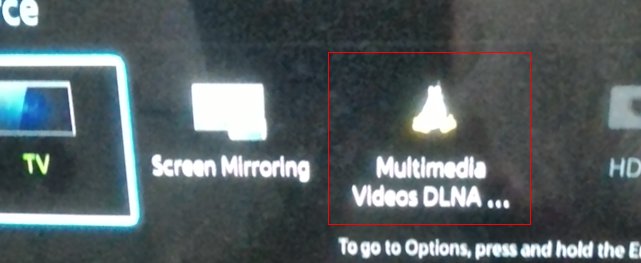
Note that when you power up your Samsung TV, you will have to wait a few seconds to allow the TV to connect to your LAN.
This is what I see when I use my Samsung TV remote control to select the server,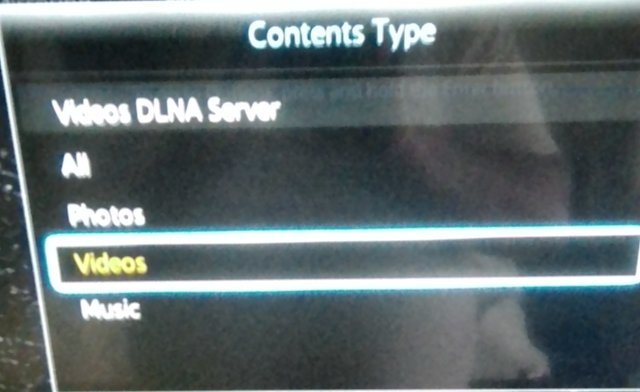
Note that minidlna can serve Music and Photos as well as Videos.
This is what I see when I navigate to Videos->...->TV Shows->Babylon 5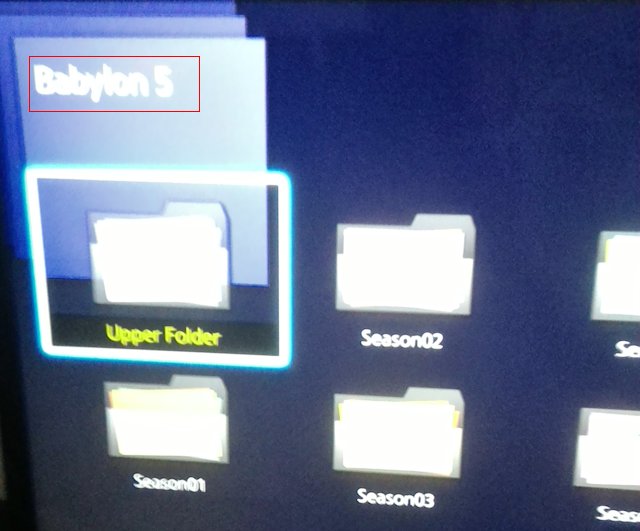
This is what I see when I enter Season01.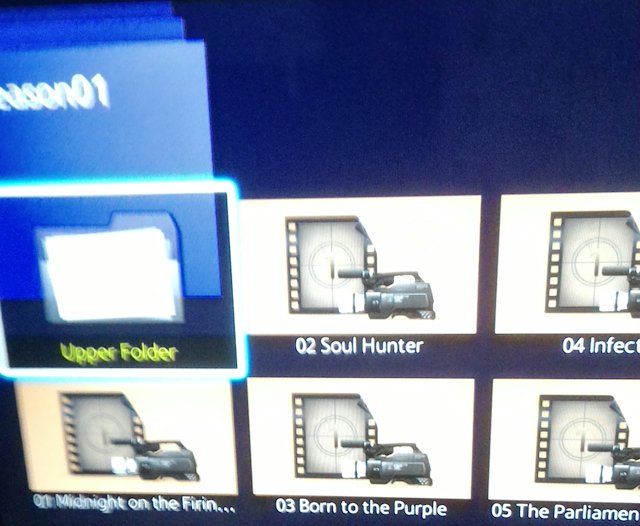
Now I can play any episode in Season 1.
Note that hardware decoders like TVs do not usually support a variety of codecs. To ensure maximum compatibility, it is best to encode your videos using the H.264 codec, mp3 for audio and JPEG for photos.
There are other hardware devices that can stream from your minidlna server. For example, some Internet Radios from Sangean and COMO can stream music from your minidlna server.
I personally have the WFR-28 since it is less expensive and takes standard D size rechargeable batteries.
#33 Re: DIY » VLC tricks » 2020-08-21 01:03:25
Hi, VLC it is very good, i use on other hardware somewhere else, but on the current obsoletes i'm running it is very limited. The GUI will make it harder for it. So mpv its better because it's light and faster. KODI no and no due to its high weight.
Thanks anyway
Hi, I didn't mean installing Kodi on your obsolete. I meant that VLC can act as a UPnP client for Kodi on another machine configured as a UPnP server. Below is VLC running on my Devuan 32bit N270 CPU netbook.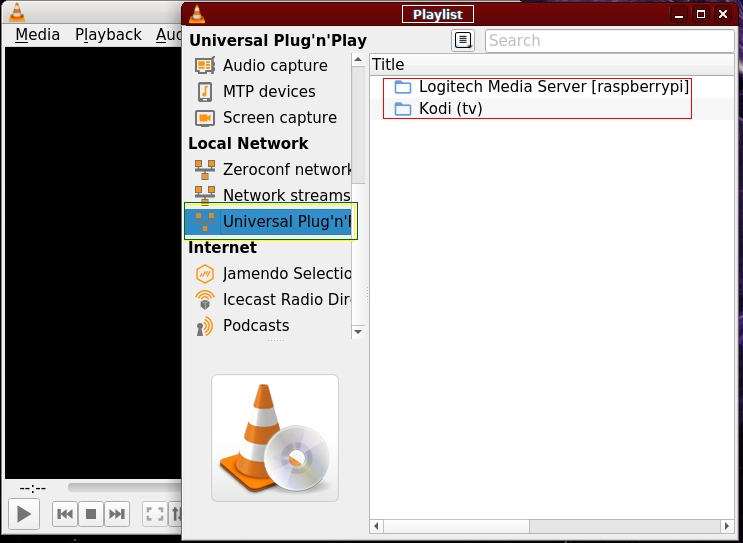
Note that the Kodi on my Fedora AMD C-70 machine connected to my TV and my Logitech Media Server on my Raspberry Pi 2 auto-magically appear and I can stream music, videos and photos simply my clicking on their folder icons.
I don't believe that there is another Devuan media player that can act as a UPnP client.
If you have a smart TV, you can simply install minidlna which I am running on low powered machines with a 260MHz MIPS 32 bit processor and 32Mb of RAM.
On a Samsung smart TV, minidlna will auto-magically appear when you press source button on the Samsung remote control. You can use the arrow buttons on the Samsung remote to select minidlna and then use the remote control to play any Video, Music or view photos. Most smart TVs can act as a UPnP client.
The minidlna server will auto-magically appear on VLC as above. Note that VLC with a UPnP client is available for IOS and Android as well.
#34 Re: Desktop and Multimedia » Choosing an email client » 2020-08-20 17:42:51
I use Thunderbird apt-get install thunderbird for a graphical e-mail client. Very easy to configure. Great support fro SOCKS proxies. When you send mail it gets sent immediately instead of hanging around in some sent-mail folder.
I use Alpine apt-get install alpine. as a text based e-mail client. Alpine has a very intuitive interface and is easy to use.
As an aside, the University of Washington, the original developers of Pine and IMAP has switched to Gmail as it continues toi transition from an institution focused on higher learning to an institution focused on the bottom line.
#35 DIY » VLC tricks » 2020-08-20 17:31:30
- Vernon
- Replies: 4
That's good to hear about stuff that suck less. I use ffmpeg to cut or merge stuff, i have heard about ffplay, but haven't watched it yet.
Bookmarked, Thanks HevyDevy!
Why not you VLC?
apt-get install vlcYou probably need to add non-free to your /etc/apt/sources.list like this
deb http://deb.devuan.org/merged beowulf main non-free contrib
deb-src http://deb.devuan.org/merged beowulf main non-free contrib
deb http://deb.devuan.org/merged beowulf-security main non-free contrib
deb-src http://deb.devuan.org/merged beowulf-security main non-free contrib
deb http://deb.devuan.org/merged beowulf-updates main non-free contrib
deb-src http://deb.devuan.org/merged beowulf-updates main non-free contribVLC has a great user interface, plays just about anything, and supports native UPnP streaming so VLC can play music and videos directly from Kodi or minidlna.
#36 Re: Installation » Network and other problems after upgrading from ascii to beowulf » 2020-08-20 14:43:06
I also have the impression that first connman is started and then the networking service, is there an easy way to check this?
Do an ls -l1 /etc/rc* | less -S and see if there is a link to a connman startup script. Note that startup script links begin with the letter S whereas shutdown script links begin with the letter K
I guess it is somewhere in the init scripts at /etc/rc.... , can I just adapt the names to force a different order?
For example change K01connman to K09connman to make sure that the connam service is started after K07networking is starting the networking service, or can I break something doing so?
Yes, but links beginning with the letter K are shutdown scripts.
#37 Re: Installation » Network and other problems after upgrading from ascii to beowulf » 2020-08-20 13:45:20
@Vernon:
Sorry the path was a typo, indeed my interface-file is at /etc/network/interfaces.
Do you think the "allow-hotplug" is making the difference, or have you additional files in your interfaces.d-directory?
Mine is empty.
Mine is empty as well.
I will try the allow-hotplug.
I don't know if this will make a difference. I can only say that this is what was in my /etc/network/interfaces file when I used connman. Note that when I used connman, the boot process would hang until DHCP timeout if I did not have an Ethernet cable plugged in.
Good Luck!
#38 Re: Installation » Network and other problems after upgrading from ascii to beowulf » 2020-08-20 11:28:12
1) After the upgrade I did not have internet access any more. It turned out that no dhc clinet is runing. After I added the following lines to /etc/interfaces
auto eth0
iface eth0 inet dhcp
dhclient is running after booting, but I still have to restart connman with the following command to get access to the internet:
service connman restart
How can I fix this?
My /etc/network/interfaces file for connman looks like this
This file describes the network interfaces available on your system
# and how to activate them. For more information, see interfaces(5).
source /etc/network/interfaces.d/*
# The loopback network interface
auto lo
iface lo inet loopback
# The primary network interface
allow-hotplug eth0
iface eth0 inet dhcpNote that BOTH the contents and the path to your interfaces file are different.
4) The directory /usr/sbin was not part of the PATH variable any more, at the moment I use the following command as root after boot:
export PATH=/usr/sbin:/sbin:/usr/local/sbin/:$PATH
How can I define this permanently?
Do I have to include this in .bashrc in the root home directory or is there a system wide configuration file?
No, you need to include a dash after su whenever you want the sbin directories in you PATH.
su -
#39 Re: Desktop and Multimedia » Cannot install VLC » 2020-08-18 11:55:06
I have not installed drivers for my HP printer yet, are there devuan repositories for that?
What is your printer model number?
#40 Documentation » HOWTO: Beowulf Printer Setup - The Easy Way » 2020-08-16 01:53:41
- Vernon
- Replies: 0
Background
Most modern printers (those manufactured after 2010) support
WI-FI Direct (Printer has its own HotSpot)
IPP
Airprint
We are going to use this fact to easily set up your printer for your Beowulf box.
Printer with an Ethernet Port
If you have a printer with an Ethernet port, like the HL-3170CDW, perform the following steps.
With an Ethernet cable, connect your printer to your wireless router,
Turn on your printer
Done!! Your Beowulf box will auto-magically detect your printer and make it available to all your applications. As an added bonus, this printer will also be auto-magically detected and available to all your Apple Macs, IPhones and Ipads.
Wireless Set-up
First, lets install some tools.
apt-get install avahi-utils mostTurn On your printer
Connect to your printer's HotSpot
Find your printer's administration web server
avahi-browse -tar | mostLook for adminurl. For the HP LaserJet M15w, the adminurl is http://NPI820824.local
Copy and paste the adminurl into your web browser and bookmark the page.
Navigate to your printer's wireless set-up page and connect your printer to your wireless router Access Point
Re-connect your Devuan box to your own WiFi network. Note that the printer's adminurl is identical whether you are connected to your printer's Access Point or your wireless router's Access Point.
Done!! Your Beowulf box will auto-magically detect your printer and make it available to all your applications. As an added bonus, this printer will also be auto-magically detected and available to all your Apple Macs, IPhones and Ipads.
Older Printers
If you have an older printer that does not support Airprint etc or even doesn't support networking that is already configured via CUPS on another system, you can make is available to your Devuan box and all Apple computers and devices as well.
On the computer with the configured CUPS printer, browse to http://localhost:631/admin. Tick the Share printers connected to this system and the Allow printing from the Internet boxes and save the changes,
Your printer should now be available to all your Linux boxes.
This link here explains how to make your printer available to all you Apple devices. I have only used this on Fedora but it should work with other Linux distributions including Devuan.
When I installed Beowulf on my netbook, all of my printers auto-magically appeared and I did not have to configure anything.
#41 Re: Desktop and Multimedia » Cherrytree and Netsurf aren't in the repository? » 2020-08-15 14:57:05
Updated with Cherrytree info
I just installed the new stable version of Devuan. To my surprise I can't install Netsurf and Cherrytree.
These applications are not part of the new Devuan stable version?
First, Thanks very much for asking this question. I had never heard of Netsurf before and wow, it is fast.
Netsurf Instructions
You can build Netsurf from source.
apt-get install build-essential libgtk-3-devThen follow the build instruction
https://source.netsurf-browser.org/nets … k-start.md
Cherrytree Instructions
Cherrytree has become a victim of the global war on Python 2.7 but we can still build it from source.
apt-get install python2
apt-get install python-gtk2
apt-get install p7zip-full
apt-get install python-dbus
apt-get install python-enchant
apt-get install python-chardetClick here and download the .deb file for your architecture, As root, run dpkg -i against the .deb file you downloaded. For the i386 architecture, the command is
dpkg -i python-gtksourceview2_2.10.1-3_i386.debDownload Cherrytree source
wget https://www.giuspen.com/software/cherrytree-0.39.4.tar.xzExtract the source
tar -xvJf cherrytree-0.39.4.tar.xzRun Cherrytree
cd cherrytree-0.39.4
./cherrytree#42 Re: Desktop and Multimedia » Cannot install VLC » 2020-08-15 14:30:59
No problems for me installing VLC on Beowulf
/etc/apt/sources.list
deb http://deb.devuan.org/merged beowulf main non-free contrib
deb-src http://deb.devuan.org/merged beowulf main non-free contrib
deb http://deb.devuan.org/merged beowulf-security main non-free contrib
deb-src http://deb.devuan.org/merged beowulf-security main non-free contrib
deb http://deb.devuan.org/merged beowulf-updates main non-free contrib
deb-src http://deb.devuan.org/merged beowulf-updates main non-free contrib #43 Re: Documentation » HOWTO: Firefox DoH (DNS over HTTPS) » 2020-08-13 20:30:50
Vernon wrote:if you do that, you will be unable to do any local LAN-only domain DNS lookups
It will if a search line is added
No, a search directive does nothing but add a domain to a hostname with zero dots. It does not change DNS resolvers. As per your example /etc/resolv.conf file.
nameserver 9.9.9.9
search lanIf I try to ping printer, the search directive will only add .lan to the host name and change the hostname to printer.lan. Nameserver 9.9.9.9 will return NXDOMAIN because the .lan domain is only in my local DNS.
#44 Re: Documentation » HOWTO: Firefox DoH (DNS over HTTPS) » 2020-08-13 00:13:01
I really don't understand what DoH offers that cannot be bettered with
# echo 'nameserver 9.9.9.9' > /etc/resolv.conf # chattr +i /etc/resolv.conf^ That will work for network activity that doesn't involve a browser, unlike DoH.
...
The short answer is that if you do that, you will be unable to do any local LAN-only domain DNS lookups. Firefox DoH allows a user to easily protect themselves when traveling from DNS poisoning while still allowing for local LAN-only DNS lookups when they return home with a one time Firefox configuration change. And as a Devuan user, you are fortunate in that your version of Firefox implements DoH correctly whereas Ubuntu's and Fedora's version of Firefox do not.
https://bugzilla.mozilla.org/show_bug.cgi?id=1610365#c4
It's important to remember that DoH or DNS over TLS does not provide you any tracking protection. Your ISP still knows every site you connect to. In fact, by using, someone else's DNS instead of your ISP's DNS, the only thing you have accomplished is to double the entities that can easily track your Internet activity - your ISP and now your DNS provider as well.
You may object and say with Devuan supporting Bonjour with mDNS (the automatic .local domain), there is no need to run a local DNS for local LAN devices. However, there are still many devices that do not support Bonjour with mDNS.
You may also object that most people do not run a local DNS. You would only be partially correct. Many people are running a DNS server but they don't know it. Many wireless router manufacturers, including such name brands as TP-Link are running a form of OpenWRT which means they are running dnsmasq which acts as both a DHCP server and a Dynamic DNS server. These routers allow you so select a local domain name in your router configuration. So, if you chose a local domain name of .lan and chose a Devuan box hostname of nosystemd, your router DNS would automatically assign your Devuan box a FQDN of nosystemd.lan. Unfortunately, many do not know that their wireless router has this capability and do not take advantage of it.
#45 Re: Documentation » HOWTO: Firefox DoH (DNS over HTTPS) » 2020-08-12 03:58:44
My own choice is to use dnscrypt-proxy.
...
Thanks for this info. I did not know about dnscrypt-proxy. You may be surprised to learn that I do not use DoH either. I just became interested in DoH when Fedora stated that they may enable DNS over TLS by default.
At home, I run my own DNS server. It is not internet facing. Debian used to, and I assume that they still do give you a fully functioning DNS server with no configuration necessary simply by typing apt-get install bind9. The Fedora package manager for bind did a better job because Fedora would update your roots file for you. Whereas, with Debian, you at least used to have to grab an update from ftp.internic.net .
Remotely, if I am concerned about DNS spoofing or other chicanery, I OpenVPN into my home OpenVPN server. My .ovpn file is configured so that I will use my home DNS and not the DNS at my remote location.
If I am concerned about anonymity, I openvpn into free VPN provider freevpn.me or vpnbook. I modify their provided .ovpn files to ensure that I am using their DNS server instead of my own.
If I desire even more anonymity, there is always I2P or freenet
#46 Re: Documentation » HOWTO: Firefox DoH (DNS over HTTPS) » 2020-08-11 21:57:58
...
DoH is not without it's criticisms: https://www.zdnet.com/article/dns-over- … perts-say/
Thanks for this link. Although I disagree with the validity of every point except the first one. DoH doesn't actually prevent ISPs user tracking, I provided this link to Firefox since they seem to be confused about what protections DoH provides as well.
https://bugzilla.mozilla.org/show_bug.cgi?id=1610365
My comments follow:
DoH doesn't actually prevent ISPs user tracking
Correct. But that is not the purpose of DoH. DoH strictly provides immunity from DNS spoofing. It's just like criticizing Firefox privacy mode for not preventing ISP tracking.
DoH bypasses enterprise policies
Yes, you will have to do a little more work to block by IP address. Too bad
DoH weakens cyber-security
Translation: DoH makes my spying more difficult
DoH also bypasses legitimate blocklists, not just censorship
This smuggles in the notion that there are legitimate block lists. This is just someone who is disappointed that DoH makes Internet censorship slightly more difficult
DoH shouldn't be recommended to dissidents
Just repeating the first point that DoH does not provide anonymity. This is just like saying that dissidents shouldn't use privacy mode because it doesn't provide anonymity either
DoH centralizes DNS traffic at a few DoH resolvers
DNS traffic is already centralized amongst a few ISP resolvers.
#47 Re: Documentation » HOWTO: Firefox DoH (DNS over HTTPS) » 2020-08-11 14:16:50
Why should I trust Cloudflare more than other DNSs?
Depends what you mean by trust.
Do you trust your dog not to rip out your throat when when you sleep? Hopefully yes.
Do you trust your dog to not steal food when you are not looking? Maybe not.
Similarly, can you trust Cloudflare to return the correct IP address when you browse to https://www.deutsche-bank.de/ and not send you to a malicious, cloned web site? Yes.
Can you trust Cloudflare not to track your DNS lookups? Probably not.
It is very easy for a malicious hotspot operator to spoof DNS lookups. I once ran a non-malicious captive portal where the DNS was configured so whatever web address a user typed in, it would resolve to the captive portal web server. I stopped doing this because so many devices cache DNS lookups these days, users would have to reboot their devices in order to restore correct DNS lookups. Firefox DNS over HTTPS immunizes you against DNS spoofing.
#48 Re: DIY » Kill openvpn in one line in Terminal » 2020-08-11 01:12:12
Also you can add local host DNS resolving to the vpn kill script.
echo "search lan nameserver 192.168.1.1" > /etc/resolv.conf
Actually, DNS changing can be better accomplished with the openvpn up and down directives as described here.
Install resolvconf packages using the following command.
apt-get install resolvconfAdd the following lines to each .ovpn file to prevent DNS leakage.
script-security 2
up /etc/openvpn/update-resolv-conf
down /etc/openvpn/update-resolv-confThe up directive is executed when openvpn starts and forces your Devuan box to use the VPN DNS servers to prevent DNS leakage.
The down directive is executed when you kill openvpn and returns your Devuan box to using the original DNS, in your case 192.168.1.1.
The advantage of using the above method is that if you are mobile and your DNS server IP address changes, the down directive will still correctly return your DNS to the original value. Whereas, your script will incorrectly change the DNS IP address to 192.168.1.1 and you will no longer be able to browse the Internet.
#49 Re: Freedom Hacks » package usbmuxd - used for IPhone Tethering » 2020-08-10 21:44:31
This solution was considered robust enough for every distribution from Fedora to Debian until they switched to systemd.
I guess that was back when udev did not kill processes. There were issues with this as processes tended to accumulate and stuff.
...
I haven't seen udev kill usbmuxd yet. However, if you are planning to use USB tethering for extended periods of time and are concerned about udev killing usbmuxd, you can just delete /lib/udev/rules.d/39-usbmuxd.rules and start usbmuxd from your init. At one of my small sites without dedicated Internet, I have a small wireless router running OpenWrt where I start usbmuxd in rc.local. When I or someone else connects an IPhone to the wireless router USB port, the whole site gets Internet. When we leave and take our IPhones with us, there is no longer any Internet and only local LAN devices are accessible.
This has worked perfectly for over a year without any intervention.
#50 Documentation » HOWTO: Firefox DoH (DNS over HTTPS) » 2020-08-10 17:12:10
- Vernon
- Replies: 13
Firefox now offers DoH (DNS over HTTPS which promises a simple way to protect yourself against DNS poisoning. DoH can be enabled through the Firefox Edit->Prefereces->General->Network Settings menu.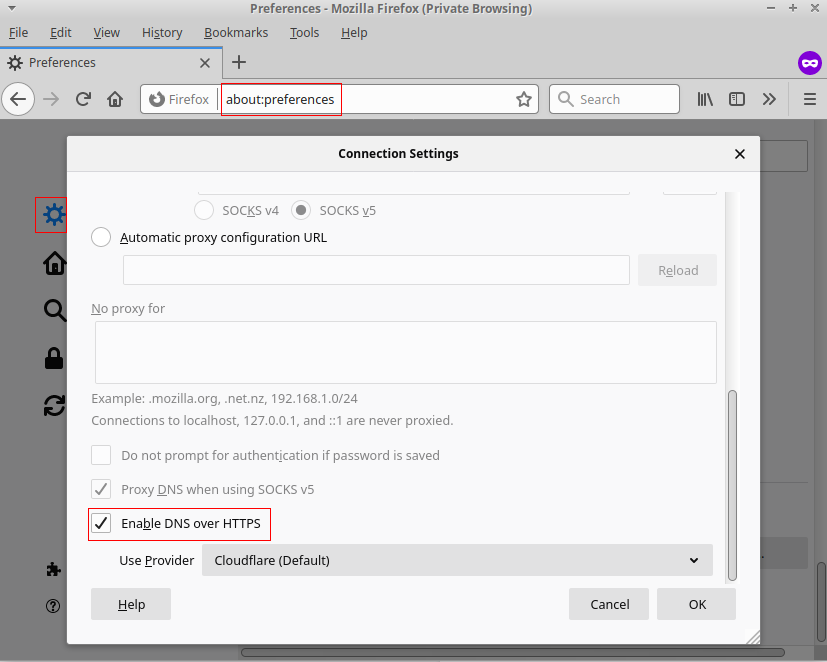
However, by default, Firefox sets DoH to TRR=2. This means that if the DoH host is unreachable or returns NXDOMAIN, Firefox will silently failover to the local, possibly poisoned DNS.
In order to ensure that Firefox always uses DoH and never fails over to the local DNS, go into the about:config settings and change network.trr.mode from 2 to 3,.

With network.trr.mode set to 3, Firefox will. display message Hmm. We’re having trouble finding that site whenever the DoH host is unreachable or returns NXDOMAIN.
More information is at
https://bugzilla.mozilla.org/show_bug.cgi?id=1656895

